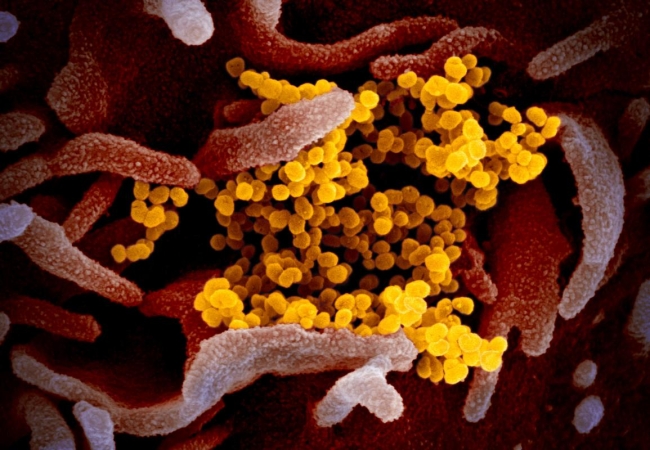You have /5 articles left.
Sign up for a free account or log in.

National Institute for Allergy and Infectious Diseases, Rocky Mountain Laboratories
The University of Michigan was the only major institution to have reported evidence of the new coronavirus variant B.1.1.7 on campus at the beginning of last week.
Five additional universities have since joined that list.
Tulane University; the University of California, Berkeley; the University of Miami; the University of Texas at Austin and the University of Washington have all now reported cases of the B.1.1.7 variant.
While viral mutations are not always cause for alarm, the B.1.1.7 variant of the virus, first discovered in Britain, transmits more rapidly and efficiently than previously observed variants of SARS-CoV-2. Some studies have suggested it also may be more deadly, but there is not currently scientific consensus on the severity of the variant.
With nearly 1,000 cases of the new variant so far in 34 states, it was only a matter of time before it reached college campuses.
“At the beginning of the semester, we identified two factors as potential difficulties: new, more contagious variants of the virus, and COVID fatigue,” said President Julio Frenk of Miami in a video statement. “This is precisely what we are seeing play out. Our analysis of test results indicates that some cases right now are caused by the U.K. strain of the coronavirus.”
Florida is so far the worst state for the B.1.1.7 variant, with 343 cases, according to the Centers for Disease Control and Prevention. Florida tops California, the state with the next highest count, by 187 cases. (Florida officials have attributed this to more testing for the variant.)
In response to the new variant cases, as well as a general COVID-19 surge across campus, Miami last week announced new restrictions for students on its campuses until at least Feb. 16. Large gatherings and any in-person activities are canceled and students are advised not to gather in groups of more than 10. In-person classes, internships, athletics and employment may continue, and the gym and pool will remain open.
“It may be tempting to dismiss the threat of new variants. Yet we all know that underestimating this virus is a mistake,” Frenk said in the video. He is also a physician and professor of public health and was Mexico’s health minister in the early 2000s.
The University of Michigan has so far reported 39 cases of the B.1.1.7 variant, according to a university spokesperson. At least one introduction of the variant into the community was related to travel to Britain. The university recently finished a two-week stay-at-home order for students, though those restrictions have now expired.
The two-week pause on activities was meant to give the campus time to sequence its positive test results and check for variants. When the two weeks were complete, university officials felt that objective had been accomplished.
“There hasn’t been widespread spreading of that variant,” the spokesperson said. The health department in Washtenaw County, where the university is located, similarly did not recommend extending the order. The university has seen over 1,000 cases of COVID-19 since Jan. 1, meaning the variant has only been found in a small minority of cases.
UT Austin has so far reported only two cases of the B.1.1.7 variant. There have so far been 35 known cases of the variant in Texas. A university spokesperson said the administration is actively looking into whether new health guidelines are appropriate.
Tulane University in New Orleans has so far reported one case of the variant that has been confirmed by the CDC. The administration established a two-week period of new restrictions during a surge last month, but with that period complete, cases have remained low, indicating that the variant does not seem to be driving a new surge, a spokesperson for the university said.
Typical tests for COVID-19 don’t indicate whether a certain variant is present or not. That means that health departments and universities only find evidence of B.1.1.7 where they’re looking for it. It is possible that cases of the new variant could be swirling in other places in the country -- or on other college campuses -- undetected.
The United States is currently 38th in the world for genomic sequencing of SARS-CoV-2, according to data from The Washington Post, and it is sequencing just 0.36 percent of confirmed cases, according to an analysis from Science.
In higher education, so far only research universities have reported cases of the variant, possibly because they have many students, but also possibly because many of them are doing sequencing for the virus in their own university labs. UT Austin, Michigan and Tulane all have had some hand in sequencing the positive cases on their campuses.
In Britain, where the variant was first discovered, government officials responded in part with strict national lockdowns, where households were prohibited from meeting and nonessential stores were closed.
The CDC has predicted that the B.1.1.7 variant could be the dominant strain of the virus in the United States by March.




